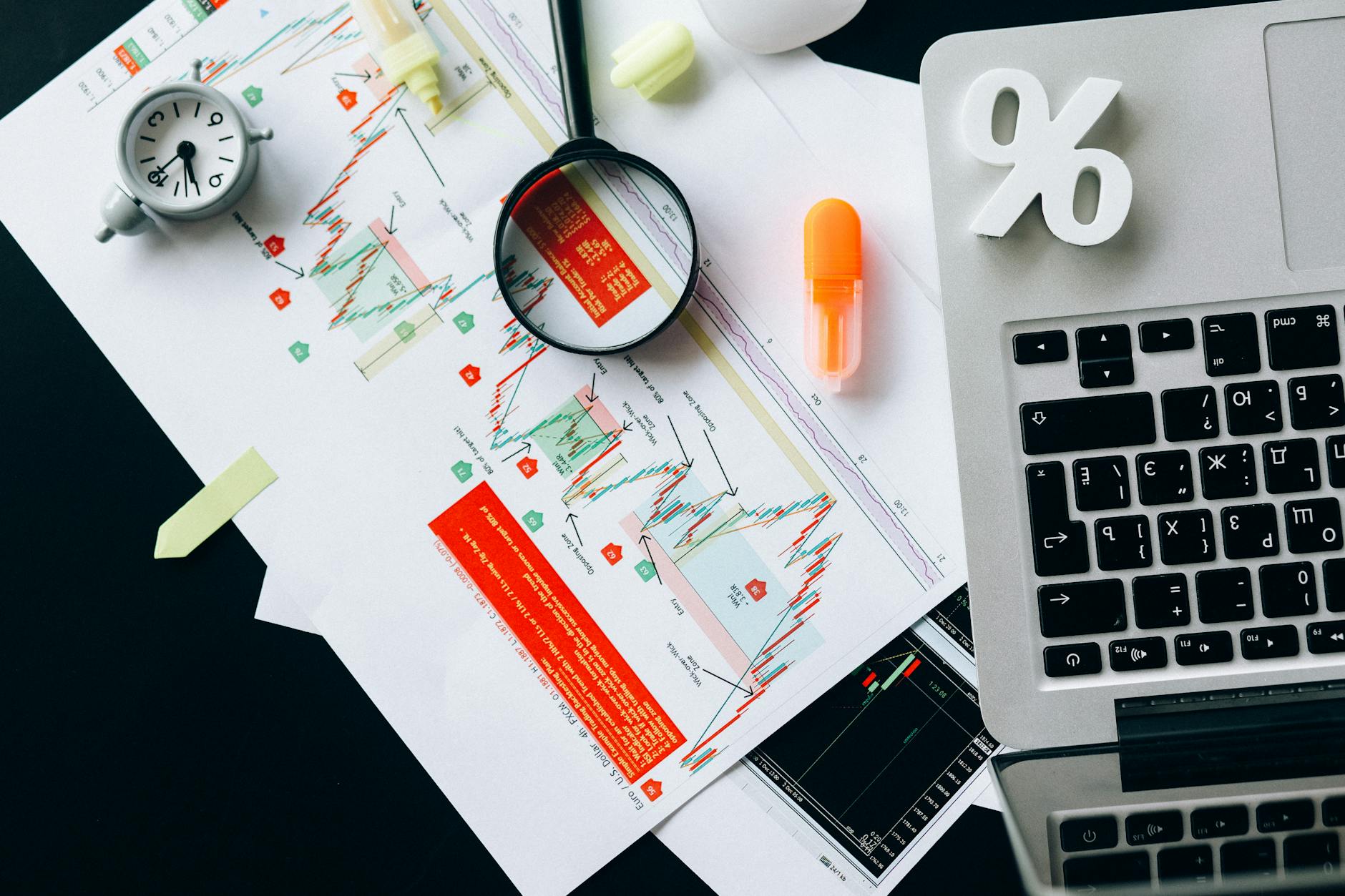How to Avoid Common Mistakes in Forex Trading: Tips for Success
Forex trading can be both exciting and daunting. Many traders, especially beginners, often stumble upon avoidable mistakes that can cost them dearly. It’s crucial to recognise these pitfalls to enhance your overall trading experience and success.
In this post, we’ll shine a light on some of the most common errors made in Forex trading. From neglecting proper research to failing to set a solid trading plan, these missteps can lead to confusion and financial losses. We’ll explore practical tips to help you steer clear of these traps and make informed decisions.
Whether you’re just starting or looking to refine your approach, understanding these common mistakes can help build your confidence in the market. Ready to improve your trading game? Let’s dive in.
Understanding Forex Trading Basics
Forex trading, also known as foreign exchange trading, is the act of buying and selling currencies. Imagine you’re on a trip abroad, and you need to swap your pounds for euros to buy a meal. This basic concept is the foundation of forex trading. But here, you’re not just swapping money for travel—you’re speculating on the value of one currency against another to profit from fluctuating exchange rates.
In the forex market, currencies are always traded in pairs, for example, EUR/USD or GBP/JPY. This means that when you buy a currency, you automatically sell another. Market dynamics are influenced by various factors ranging from economic indicators to geopolitical events. Understanding how these factors impact currency values is crucial for success in trading.
You can start your journey by learning more about what forex trading is, as familiarising yourself with basic terms and concepts will lay a solid foundation.
What is Forex Trading?
Forex trading involves buying one currency while simultaneously selling another, driven by the hope of profiting from changes in their value. For instance, when you believe the euro will strengthen against the dollar, you would buy the EUR/USD pair. If your prediction is correct, you could sell it later at a higher price. This process requires a good grasp of market indicators and trends, as misjudgements can lead to losses.
Here are some key components of forex trading to keep in mind:
- Currency Pairs: Always quoted in pairs, showing the exchange rate between two currencies.
- Pips and Lots: A pip is the smallest price move in a currency pair, while lots refer to the size of your trade.
- Market Hours: The forex market operates 24 hours a day, allowing trading at any time around the globe.
Grasping these fundamentals is essential for avoiding common mistakes faced by newcomers.
The Importance of Education in Forex
Education is a vital component of successful forex trading. Many traders jump into the market without understanding the complexities involved, which can lead to poor decisions. Continuous learning helps you adapt to changing market conditions and enhances your trading skills over time.
Here are a few reasons why education is essential:
- Understanding Market Dynamics: A solid understanding of how markets operate allows for better decision-making.
- Developing Strategies: Education equips you with the strategies used by experienced traders, helping you better navigate the ups and downs of trading.
- Risk Management: Knowing how to manage risk can save you from significant losses, a skill often learned through education and practice.
To deepen your understanding of the topic, check out this resource on the importance of forex education.

Photo by D’Vaughn Bell
Common Mistakes to Avoid in Forex Trading
Forex trading can be exciting, but it also comes with hurdles. Many traders, especially those new to the market, tend to overlook essential practices. Recognising common mistakes not only safeguards your investments but also enhances your trading proficiency. Here are several critical missteps to avoid, along with insights into better practices.
Not Having a Trading Plan
A solid trading plan is essential for achieving success in Forex trading. Without a structured approach, decisions are often made on impulse, leading to costly errors. Here are the vital components every trading plan should include:
- Goals: Define your objectives clearly. Are you aiming for long-term gains or short-term profits?
- Risk Management: Specify how much capital you are willing to risk on each trade. A common approach is to limit risk to 1-2% of your trading capital.
- Entry and Exit Strategies: Establish criteria for entering and exiting trades to maintain objectivity.
- Performance Evaluation: Regularly review your trades to assess what works and what doesn’t. This iterative process helps refine your strategy.
For more information on crafting a trading plan, check out this guide on trading plans.

Photo by Nataliya Vaitkevich
Overleveraging Your Trades
Utilising excessive leverage can seem appealing, but it poses significant risks. Overleveraging means controlling a larger position size than your capital can support. This can quickly lead to substantial losses. To manage leverage properly, consider these tips:
- Know Your Limits: Understand how much leverage you are comfortable using. A more conservative approach can protect your capital.
- Use Stop-Loss Orders: Always set stop-loss orders to limit potential losses. This is crucial, especially when trading on margin.
- Stay Informed: Keep up with market trends and news that could impact volatility, allowing you to adjust your leverage accordingly.
For more on managing leverage responsibly, see this article on overleveraging in trading risks.
Ignoring Risk Management Principles
Risk management is often neglected but is crucial for sustained success in Forex trading. Without it, losses can escalate rapidly. Key aspects of effective risk management include:
- Stop-Loss Orders: Always set stop-loss points to limit how much you can lose on a single trade.
- Take-Profit Levels: Define exit points to secure profits when your trades move in your favour.
- Diversification: Avoid putting all your capital into one trade. Diversifying across different pairs can help reduce risk.
To learn more about implementing risk management strategies, visit this resource on Forex risk management.
Emotional Trading and Psychological Traps
Emotional trading can derail your strategy quickly. Fear and greed often cloud judgment, leading to impulsive decisions. Here are some strategies to stay objective:
- Stick to Your Plan: Follow your trading plan religiously to avoid emotional reactions based on market changes.
- Take Breaks: Step away from the screen after a loss. This helps clear your mind and allows you to reassess your strategy without panic.
- Practice Mindfulness: Training yourself to recognise emotional responses can keep you from acting on impulse.
For insights into managing trading emotions, explore this guide on emotions in trading.
Failure to Adapt to Market Changes
The Forex market is dynamic. Sticking with outdated strategies can lead to missed opportunities or increased losses. Here’s how to adapt:
- Stay Updated: Follow financial news and reports to understand shifts that could impact currency values.
- Review Strategies Regularly: Periodic assessments of your approach help ensure it aligns with current market conditions.
- Be Flexible: Cultivate the ability to pivot your strategy based on new information or market trends.
Lastly, understand how to modify your strategies by checking this article on adapting trading strategies to market conditions.
Best Practices for Successful Forex Trading
Navigating the forex market requires more than instinct. Adopting best practices can significantly enhance your chances of success. By setting realistic goals, committing to continuous learning, employing prudent risk management, and effectively using technology, you can avoid common pitfalls and boost your trading effectiveness.
Setting Realistic Goals
Establishing achievable trading goals is a cornerstone of successful forex trading. Goals give you direction and a way to measure progress. When setting goals, consider the following aspects:
- Specific: Clearly define what you want to achieve. For instance, aim to increase your account balance by 10% over three months.
- Measurable: Set quantifiable metrics that allow you to track progress effectively.
- Achievable: Be honest about your experience and skills. Start with smaller, attainable goals to build confidence.
- Time-Bound: Set a timeline for your goals to create urgency and focus.
When you have clear goals, it’s easier to stay disciplined and make informed trading decisions. For further reading on crafting effective trading goals, check out How to Set Realistic Trading Goals.
Continuous Learning and Improvement
The forex market is constantly evolving. To keep up, commit to ongoing education and improvement. Here’s why it’s essential:
- Adaptation: Markets change due to economic events, rates, and geopolitical factors. Continuous learning helps you adjust your strategies accordingly.
- Strategy Refinement: By reviewing and refining your strategies regularly, you can identify what works and what doesn’t.
- Market Analysis Skills: Gaining a deeper understanding of market indicators can help you predict future movements better.
A learning mindset keeps you prepared for market changes, allowing you to seize opportunities. Explore more about essential trading habits in this article on 8 Forex Trading Tips.
Prudent Risk Management Techniques
Effective risk management is vital to protect your capital. Consider these techniques:
- Stop-Loss Orders: These orders automatically close your trades at a predetermined price, helping minimise losses.
- Position Sizing: Determine how much of your total capital you will risk on each trade. A common rule is to risk no more than 1-2% of your account balance.
- Diversification: Spread your investments across different currency pairs. This reduces the impact of a single loss on your overall portfolio.
Using robust risk management strategies ensures that you can sustain losses and continue trading without significant damage. For more detailed insights, visit 5-Step Guide to Winning Forex Trading.

Photo by Nataliya Vaitkevich
Using Technology and Tools Effectively
Technology can enhance your trading effectiveness. Consider these suggestions:
- Trading Platforms: Choose a reliable platform with advanced charting tools. This allows for better analysis and decision-making.
- Automated Trading Systems: These can execute trades based on set parameters, reducing the emotional impact of trading.
- Market News Apps: Staying updated with real-time news can provide insights into potential market movements.
Leveraging technology smartly not only improves efficiency but also allows you to focus on strategy. For more on making the most of trading technology, read Habits of Successful Forex Traders.
Conclusion
Avoiding common mistakes in forex trading is essential for success. Remember the importance of having a solid trading plan and practising effective risk management.
Emotional control and ongoing education can significantly impact your trading results.
Take the knowledge you’ve gained and apply it with confidence.
What strategies will you implement to avoid pitfalls in your trading journey? Thank you for reading, and feel free to share your thoughts!










